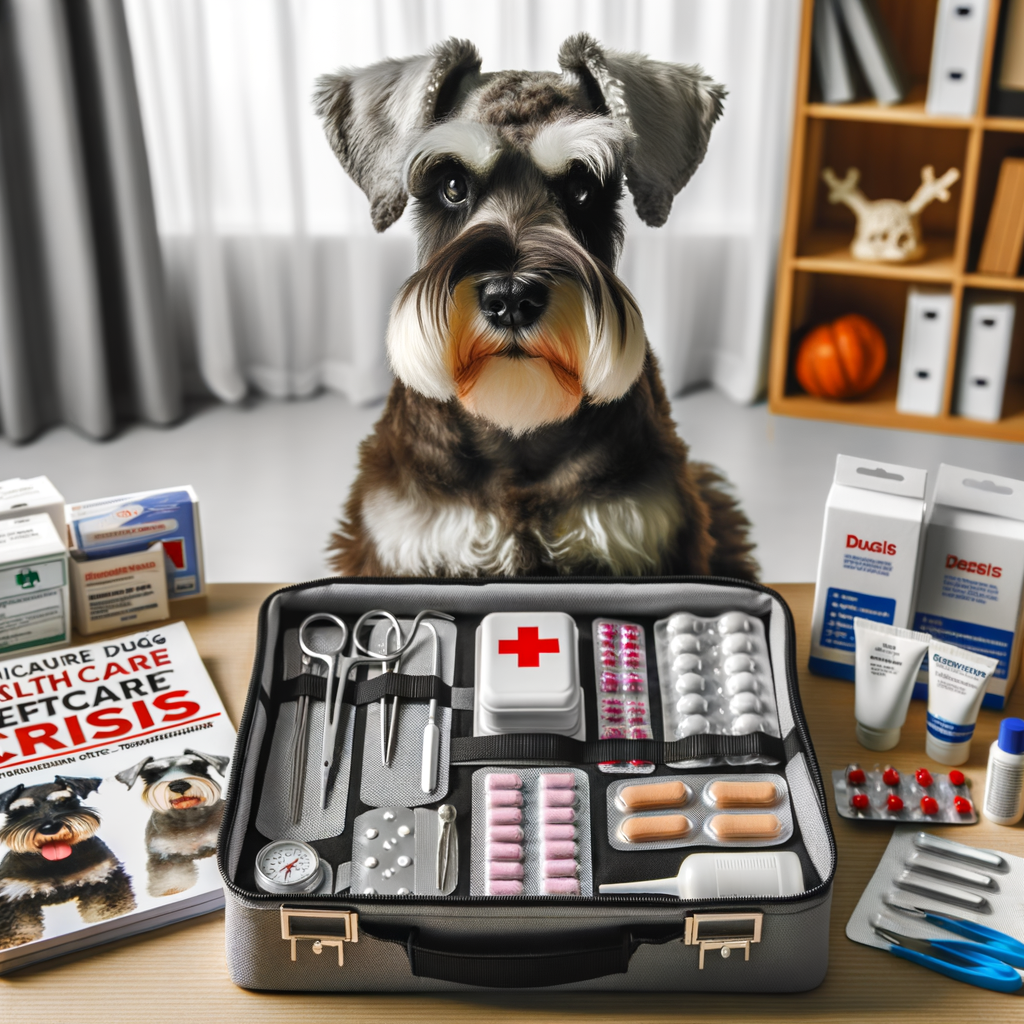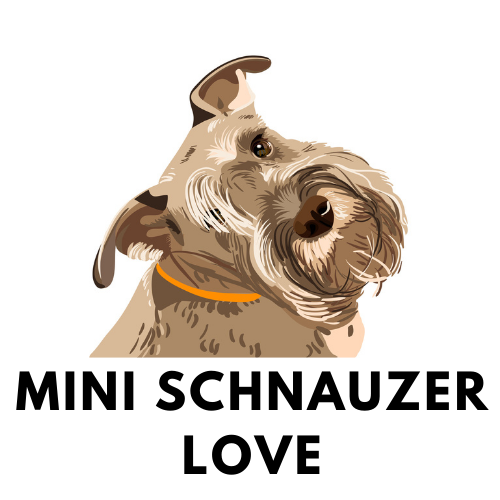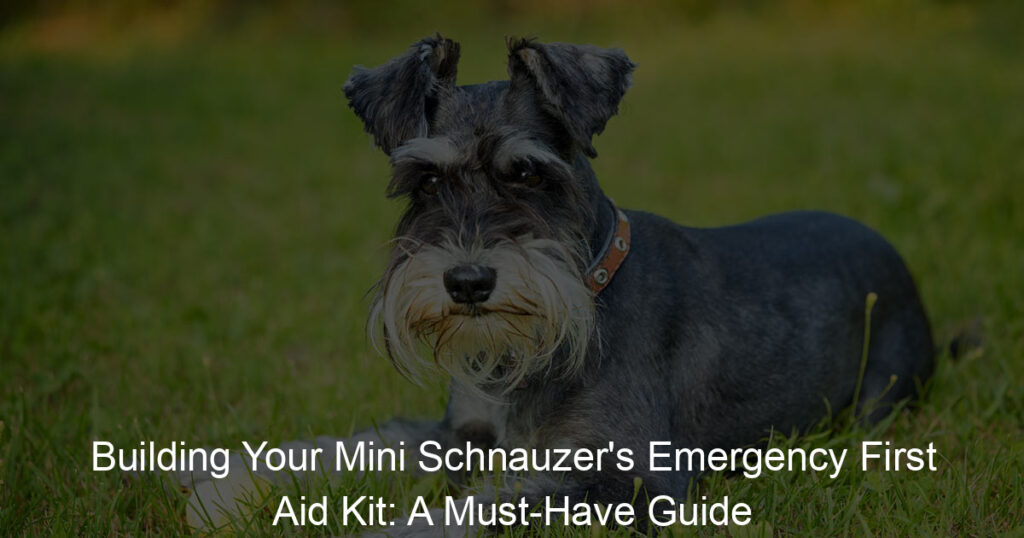
Introduction: Importance of a Mini Schnauzer First Aid Kit
As a Mini Schnauzer owner, you are responsible for the well-being of your furry friend. One of the most important aspects of pet care is being prepared for emergencies. This is where a first aid kit specifically designed for your Mini Schnauzer comes into play.
- Understanding the need for a first aid kit for your Mini Schnauzer
- How a well-equipped first aid kit can save your pet’s life in emergencies
Mini Schnauzers, like all dogs, are curious and adventurous. This can sometimes lead to minor injuries or health issues. A first aid kit allows you to respond quickly and effectively to these situations, reducing the risk of complications. It’s not just about bandages and antiseptics; a good first aid kit includes items to deal with a range of potential issues, from insect stings to digestive problems.
In a serious emergency, the time it takes to get your Mini Schnauzer to a vet can be critical. A well-stocked first aid kit can provide immediate relief and potentially life-saving treatment while you’re on the way to professional help. For example, having a pet-specific thermometer can help you quickly identify a fever, while a simple bandage can stop bleeding and prevent infection.
Remember, a first aid kit is not a replacement for veterinary care, but it can make a significant difference in an emergency situation. It’s about being prepared and giving your Mini Schnauzer the best possible chance in a crisis.
Essential Supplies for Emergencies
When it comes to emergencies, especially those involving our beloved Mini Schnauzers, being prepared can make all the difference. Having essential supplies on hand can help you respond quickly and effectively. Let’s take a look at some of the crucial medical supplies you should have in your emergency kit.
Medical Supplies
Medical supplies are the backbone of any emergency kit. They are the first line of defense when your pet is injured or unwell. Here are some of the most important items to include:
- Bandages and Gauze: These are essential for treating wounds. Bandages can help stop bleeding and protect wounds from infection. Gauze is useful for cleaning wounds and can also be used as a makeshift bandage in a pinch.
- Antiseptic Wipes: Antiseptic wipes are used to clean wounds and prevent infection. They are easy to use and can be a lifesaver in an emergency situation.
- Hydrogen Peroxide: This is a common household item that can be used to clean wounds. However, it should be used with caution as it can damage healthy tissue if used too often.
- Thermometer: A thermometer is important for checking your pet’s temperature. A high temperature can be a sign of infection or illness, so it’s important to have one on hand.
Remember, these supplies are just the basics. Depending on your pet’s specific needs, you may need to add more items to your kit. The key is to be prepared and have the supplies you need when you need them.
Comfort Supplies
When dealing with emergencies, it’s not just about the medical supplies. Your Mini Schnauzer also needs comfort supplies to help them feel safe and secure. These items can help reduce stress and anxiety, making it easier for your pet to recover. Here are some essential comfort supplies you should include in your dog’s first aid kit:
- Blankets
- Soft Toys
- Comforting Treats
A soft, warm blanket can provide your Mini Schnauzer with a sense of security during stressful situations. It can also help keep them warm if they’re in shock. Choose a blanket that’s easy to wash and dry, as it may get dirty during emergencies.
Soft toys can provide a source of comfort for your Mini Schnauzer. They can be a familiar item in an unfamiliar situation, helping to reduce anxiety. Make sure to choose a toy that your dog is already attached to, as this will provide the most comfort.
Treats can be a great way to distract your Mini Schnauzer during a stressful situation. They can also be used as a reward for good behavior during a difficult time. Choose treats that your dog loves, but make sure they’re healthy and safe for your pet to eat.
Remember, the goal of these comfort supplies is to help your Mini Schnauzer feel safe and secure during an emergency. By including these items in your dog’s first aid kit, you’re helping to ensure their mental well-being, as well as their physical health.
Building Your Dog First Aid Kit
Building a first aid kit for your Mini Schnauzer is an essential step in ensuring their health and safety. This kit will be your go-to resource in case of any health emergencies. Here are some steps to guide you in building your dog first aid kit:
- Choosing a container for your Mini Schnauzer Health Care kit
- Organizing your supplies
- Keeping your kit updated and ready
First, you’ll need a container to hold all your supplies. This could be a plastic box, a bag, or even a suitcase – as long as it’s sturdy, easy to carry, and can be sealed to keep the contents clean and dry. It’s also a good idea to choose a container that’s big enough to hold all your supplies but small enough to be portable. You never know when or where an emergency might occur, so it’s important to have your kit ready to go at all times.
Once you have your container, it’s time to start gathering your supplies. These should include items like bandages, tweezers, a thermometer, and a first aid manual. It’s also a good idea to include some dog-specific items, like a muzzle (to prevent biting during a stressful situation), a leash, and a blanket. Organize your supplies in a way that makes sense to you, so you can easily find what you need in an emergency.
Finally, it’s important to keep your kit updated and ready. Check your supplies regularly to make sure they’re not expired or damaged, and replace any items as needed. It’s also a good idea to review your first aid manual from time to time, so you’re familiar with the procedures and can act quickly in an emergency.
In conclusion, building a first aid kit for your Mini Schnauzer is not just a task, but a responsibility. It’s an investment in your dog’s health and safety, and it can make all the difference in an emergency. So take the time to build your kit, keep it updated, and always have it ready to go. Your Mini Schnauzer will thank you!
Emergency Supplies for Dogs: Special Considerations for Mini Schnauzers
When it comes to emergency supplies for dogs, it’s important to consider the specific needs of your breed. Mini Schnauzers, for example, have unique health issues that may require special items in your first aid kit.
- Understanding the breed-specific health issues of Mini Schnauzers
Mini Schnauzers are a robust breed, but they are prone to certain health conditions. These include pancreatitis, diabetes, and skin disorders. Understanding these health issues can help you prepare for emergencies.
| Health Condition | Symptoms | Emergency Supplies |
|---|---|---|
| Pancreatitis | Abdominal pain, vomiting, loss of appetite | Anti-nausea medication, electrolyte solutions |
| Diabetes | Excessive thirst, frequent urination, weight loss | Glucose gel, insulin syringes |
| Skin Disorders | Itching, redness, hair loss | Antihistamines, hydrocortisone cream |
- Adding breed-specific items to your first aid kit
Once you understand the health issues that Mini Schnauzers are prone to, you can add breed-specific items to your first aid kit. For example, you might want to include anti-nausea medication for pancreatitis, glucose gel for diabetes, and hydrocortisone cream for skin disorders. Remember, these are just examples. Always consult with your vet to determine the best items for your pet’s first aid kit.
In conclusion, being prepared for emergencies involves understanding your Mini Schnauzer’s specific health needs and tailoring your first aid kit accordingly. This will ensure that you’re ready to provide the best care for your pet in any situation.
First Aid for Mini Schnauzers: Basic Techniques
When it comes to our beloved Mini Schnauzers, we want to ensure they are safe and healthy. Knowing basic first aid techniques can be a lifesaver in an emergency situation. In this section, we will focus on handling injuries, specifically how to bandage and clean a wound.
Handling Injuries
Accidents can happen at any time. It’s important to stay calm and handle the situation with care. Here are some basic steps to follow when your Mini Schnauzer has a wound.
- How to Bandage a Wound
- First, gently clean the wound with warm water and mild soap.
- Apply a pet-safe antiseptic to the wound.
- Place a clean, soft cloth or gauze over the wound.
- Secure the cloth or gauze with a bandage. Make sure it’s not too tight to avoid cutting off circulation.
- Keep an eye on the wound and change the bandage daily, or when it becomes wet or dirty.
- How to Clean a Wound
- Gently remove any debris from the wound using tweezers cleaned with alcohol.
- Wash the wound with warm water and mild soap. Avoid using hydrogen peroxide as it can delay healing.
- Pat the wound dry with a clean towel.
- Apply a pet-safe antiseptic to the wound.
- If the wound is deep or severe, seek immediate veterinary care.
Bandaging a wound correctly can prevent further injury and infection. Here’s how you can do it:
Cleaning a wound properly is crucial to prevent infection. Here’s a simple guide:
Remember, these are basic first aid techniques. Always consult with your vet if you’re unsure or if the injury seems severe. Your Mini Schnauzer’s health and safety should always be your top priority.
Handling Illnesses
Just like humans, Mini Schnauzers can also fall ill. It is crucial for pet owners to recognize the signs of illness and know when to seek veterinary care. Let’s delve into these two important aspects.
- Recognizing signs of illness
Recognizing the signs of illness in your Mini Schnauzer is the first step towards ensuring their health and well-being. Here are some common signs that your pet might be unwell:
- Change in appetite or water consumption
- Unusual weight loss or gain
- Difficulty in breathing
- Excessive sleeping or lack of energy
- Unusual discharge from the eyes or nose
- Repeated vomiting or diarrhea
These are just a few signs. If you notice any unusual behavior in your Mini Schnauzer, it’s always a good idea to consult with a vet.
- When to seek veterinary care
It’s important to remember that you know your Mini Schnauzer best. If you notice any changes in their behavior or physical condition that concern you, it’s time to seek veterinary care. Here are some situations when you should immediately contact a vet:
| Situation | Action |
|---|---|
| Your Mini Schnauzer has been injured in an accident | Contact your vet immediately |
| Your pet is experiencing difficulty breathing | Seek emergency veterinary care |
| Your Mini Schnauzer is not eating or drinking for more than 24 hours | Make an appointment with your vet |
| Your pet has repeated episodes of vomiting or diarrhea | Call your vet as soon as possible |
Remember, it’s always better to be safe than sorry. If you’re unsure, it’s best to consult with a professional.
Preparing for Pet Emergencies: Training and Preparation
When it comes to your Mini Schnauzer, being prepared for emergencies is crucial. This involves learning basic pet first aid techniques, preparing for common emergencies, and creating an emergency plan. Let’s delve into each of these aspects.
- Learning basic pet first aid techniques
Understanding basic pet first aid can be the difference between life and death for your Mini Schnauzer. This includes knowing how to perform CPR, treat minor wounds, and recognize signs of distress. For instance, a rapid heartbeat, difficulty breathing, or sudden changes in behavior could indicate a medical emergency. It’s advisable to take a pet first aid course or consult with your vet to gain these skills.
- Preparing for common emergencies
Common emergencies for Mini Schnauzers include choking, poisoning, and injuries from accidents. It’s important to know how to respond in these situations. For example, if your pet is choking, you’ll need to open their mouth and carefully remove the obstruction. If they’ve ingested a toxic substance, you’ll need to induce vomiting and seek immediate veterinary care. Always keep the contact details of your vet and a 24-hour emergency clinic handy.
- Creating an emergency plan
An emergency plan outlines the steps you’ll take in case of a pet emergency. This includes having a designated emergency contact, knowing the quickest route to the nearest emergency vet clinic, and having a pet first aid kit readily available. Your plan should also include instructions for care if you’re not home during the emergency. Remember, preparation is key to ensuring the safety and wellbeing of your Mini Schnauzer.
In conclusion, preparing for pet emergencies involves learning basic first aid techniques, understanding common emergencies, and creating a comprehensive emergency plan. By being prepared, you can ensure that your Mini Schnauzer receives the care they need in a timely manner, potentially saving their life.
Conclusion: Mini Schnauzer Care Tips for a Healthy, Happy Pet
As we wrap up our discussion on the importance of a first aid kit for your Mini Schnauzer, let’s not forget that prevention is always better than cure. Ensuring your pet’s overall health and happiness involves more than just being prepared for emergencies. It requires consistent care and attention in their day-to-day lives. Here are some key tips to keep your Mini Schnauzer healthy and happy:
- Regular check-ups and vaccinations: Regular veterinary check-ups are crucial for your Mini Schnauzer’s health. These check-ups can help detect any potential health issues early, allowing for prompt treatment. Vaccinations also play a vital role in preventing serious diseases. According to the American Veterinary Medical Association, core vaccines for dogs include those against rabies, distemper, parvovirus, and adenovirus.
- Proper diet and exercise: A balanced diet and regular exercise are essential for your Mini Schnauzer’s health. Mini Schnauzers require a diet rich in protein, fiber, and healthy fats. Regular exercise, such as daily walks and playtime, can help keep your pet physically fit and mentally stimulated. Remember, an overweight Mini Schnauzer can face numerous health problems, including heart disease and diabetes.
- Love and attention: Last but not least, your Mini Schnauzer needs plenty of love and attention. Regular interaction, playtime, and cuddles can help keep your pet happy and emotionally healthy. Studies have shown that pets who receive regular affection from their owners are less likely to exhibit behavioral problems.
In conclusion, taking care of a Mini Schnauzer involves more than just having a well-stocked first aid kit. It’s about providing consistent care, love, and attention to ensure they lead a healthy, happy life. Remember, a healthy pet is a happy pet!














